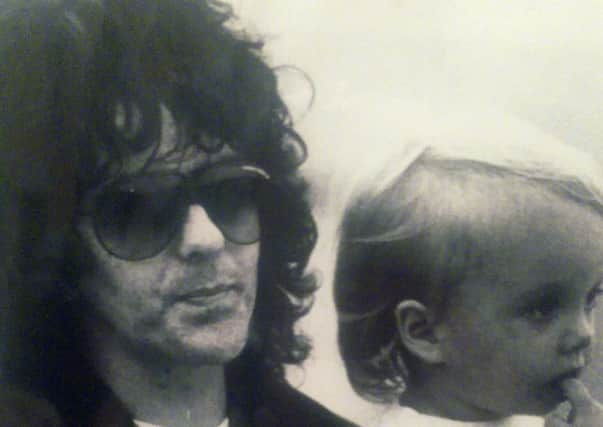Obituary: Jimmy Bain, musician


Jimmy Bain was a Scots-born bass player, musician and songwriter whose lengthy career saw him working with some of the most iconic figures in rock music. In the late 1970s he briefly played with Deep Purple founder Ritchie Blackmore and future Black Sabbath singer Ronnie James Dio’s group Rainbow, later joining Dio in his own self-titled band for a number of albums. A close friend of Thin Lizzy frontman Phil Lynott, he appeared on their 1979 album Black Rose: A Rock Legend and Lynott’s solo records Solo in Soho (1980) and The Phil Lynott Album (1982).
Also a co-writer of various tracks on Lynott’s solo projects, the pair’s song Old Town was later covered for MTV Unplugged and released as a single by Irish folk-pop quartet The Corrs. A member of many other rock groups which didn’t achieve the fame of Rainbow or Dio, Bain also took on a number of projects which were less obvious. As well as recording with Thin Lizzy guitarist Gary Moore, he played for Welsh Velvet Underground co-founder John Cale, English folk guitarist Roy Harper and on Kate Bush’s 1982 album The Dreaming.
Advertisement
Hide AdAdvertisement
Hide AdAlthough Bain’s extensive career in rock has been well-documented, details of his earlier life have been less well-explored. He was born James Stewart Bain in the village of Newtonmore in the Scottish Highlands on the 19th of December 1947, but by the mid-1960s he was living in Dunbar, East Lothian, where he formed his first group Nick and the Sinners. Around this time came what Bain, originally a lead guitarist, in later years recalled as being his most influential moment, seeing Jimi Hendrix play live in Stockholm, but his next group were instead heavily influenced by the R&B-heavy mod scene of the time. The Embers were local favourites, and part of the same scene as Glasgow’s Beatstalkers.
In the early 1970s Bain played in the groups Street Noise and Choker, and briefly joined his parents and brother as migrants to Vancouver, British Columbia. It was in London in 1975, however, that his career took off. The previous year Bain had turned down London rock group The Babys, who went on to have a number of American hits, in favour of playing bass with the short-lived Harlot. In a sense, though, it was this band’s lack of potential which helped Bain pass the most important audition of his life.
Rainbow’s 1975 debut album was recorded by Blackmore using Dio’s group Elf as his backing band, but after its release the guitarist and singer resolved to hire more proficient players for the follow-up. Getting wind that he was being considered as the new bass player, Bain was dismayed to find Blackmore, Dio and Rainbow’s management watching Harlot during an appalling gig at the Marquee Club. Apologising for the performance of his bandmates and the apparent drunkenness of the drummer afterwards, Bain was told “well, they made you look good.”
He had the gig, although it wasn’t to prove a long-term one. One of Bain’s first tasks with Rainbow was to help cast the other members of the band, assisting Blackmore and Dio with the auditions which found, amongst others, the iconic rock drummer Cozy Powell, and the new line-up went on to record 1976’s Rising album. With a group of players capable of living up to Blackmore’s playing, it reached number 11 in the UK chart and is now considered a classic of the early heavy metal era. Yet there were tensions between Bain and Blackmore, and the bassist was removed from the band before Rainbow’s next album and the huge commercial success they enjoyed in the early 1980s. He did, however, play on 1977’s On Stage live album, which reached number seven in the UK.
Over the next half-decade and more, Bain drifted between temporary and less successful projects, playing in Cale and Harper’s live bands and recording with Lynott, Moore and Bush (the latter at Harper’s recommendation). Furthering the Thin Lizzy connection, he was also in a group named Wild Horses with their Renfrewshire-born former guitarist Brian Robertson between 1978 and 1981; they released two albums on EMI, but neither was successful.
In 1983 Bain played uncredited session bass parts for the highly successful German rock group Scorpions’ ninth album Love at First Sting. Yet Bain was already being courted by – and subsequently chose to join – Dio’s self-titled group, which was formed by Dio and drummer Vinnie Appice following their departure from Black Sabbath in 1982. It proved to be a wise decision. Dio’s albums Holy Diver (1983), The Last in Line (1984), Sacred Heart (1985) and Dream Evil (1987) were all large-selling successes, and bore six top 40 US singles between them.
Yet Bain was unhappy with Dio’s decision to sack guitarist Vivian Campbell after Sacred Heart, and he also left after Dream Evil, the record which signalled a commercial downturn for the group. Bain was reunited with his former bandmates in later years, however. He played on Dio’s albums Magica (2000) and Killing the Dragon (2002), performed with Appice in rock covers supergroup Hollywood Allstarz and played original material with him in 3 Legged Dogg, and at the time of his death, Bain, Appice and Campbell were together again in a group called Last in Line. He passed away while they were on a cruise ship festival organised by Def Leppard.
Bain also explored projects called WWIII and The Key during the 1990s, although this was the point at which his alcohol and heroin abuse were at their nadir. He cleaned up at various times in later life, although was charged with driving under the influence and illegaly possessing prescription medication in Hollywood in 2012, sadly embracing the rock lifestyle as wholeheartedly as he helped create its powering rhythm.
In interview, however, he has said that his greatest achievements in life were his daughter and grandchildren, who survive him.
DAVID POLLOCK